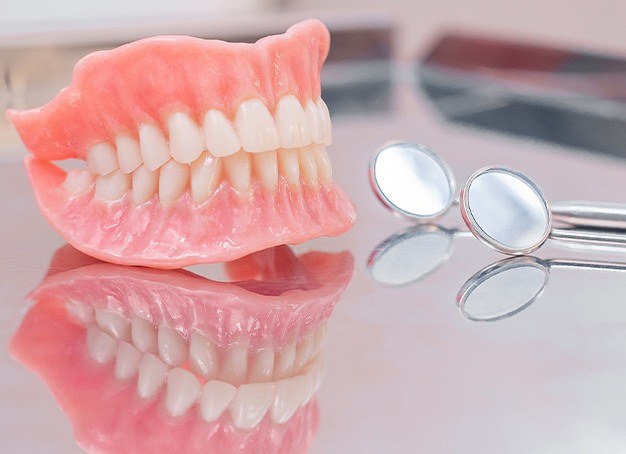Our goal is to give patients a healthy, beautiful smile that’s confident and supports overall wellness. If you’re missing teeth, it can be difficult to perform basic functions, such as biting and chewing. Many patients also suffer from embarrassment and are afraid to even smile. No matter the reason you’ve lost teeth, from genetic disorders to injury and dental disease, you should never be ashamed. Our goal is to restore your oral health with partial or full dentures from our Parsippany, NJ dentist.
Who is a Candidate for Dentures?
If you’ve experienced significant tooth loss in one or both arches, you might be a candidate for dentures or partials. If you’re ready to replace your lost teeth, we’ll create the personalized treatment plan you need to achieve the complete smile you deserve.
What are My Replacement Options?
At Rauchberg Dental Group, we provide replacement teeth made from advanced dental materials. Dr. Rauchberg pays close attention to detail, creating a prosthetic that closely matches gum color. In addition, we take the tooth size, shape, and color into consideration, so that your denture will look as realistic as possible.
Partial Denture
A partial denture is a prosthetic that replaces several missing teeth in one arch. They consist of a gum-colored base with replacement teeth that fit like a puzzle with your natural ones. Dr. Rauchberg designs your prosthetic with both aesthetics and function in mind, making sure your partial blends with your natural smile. Partial dentures can be removable or fixed. Dr. Rauchberg will explain your options and which is right for you.
Full Dentures
Patients missing a full arch of teeth are candidates for full dentures. A complete set of replacement teeth is attached to a custom-made base to fit your mouth. They are molded to conform to your gums and jawbone ridge to be held in place naturally. The muscles in and around your mouth will adjust to help secure your full dentures.
Dental Implant-Retained Dentures
Implant-retained dentures permanently eliminate any slipping and irritation by using 4 to10 dental implants to anchor your denture to your jawbone. This replicates the entire tooth structure, allowing you to enjoy a close replica of your natural smile. Not to mention, it has the potential to last for a lifetime for a long-term investment in your smile.
What are the Benefits of Dentures?
Replacing missing teeth allows you to eat and chew comfortably while looking younger because they support full cheeks to prevent a sunken appearance. With a full set of teeth, you’ll have the self-assurance to laugh and smile without any worry. We’ll restore your oral health and your quality of life using a solution that looks natural.
Denture Aftercare
Although dentures aren’t subject to decay, you’ll still need to brush them using a nonabrasive toothpaste to remove trapped food particles and odor-causing bacteria. When your dentures aren’t in your mouth, it’s best to soak them in a special solution to sanitize them, and you don’t want them drying out. It’s also important to maintain routine appointments with your dentist for maintenance and adjustments.
Denture Frequently Asked Questions
Do you still have questions about replacing your missing teeth with full or partial dentures? We don’t want you to miss out on this life-altering tooth replacement treatment, which is why we want to make sure that you get all of your concerns and questions addressed! Below, we’ve answered some of the most common questions that we receive from our patients for your convenience. If you don’t see yours, don’t hesitate to call us.








